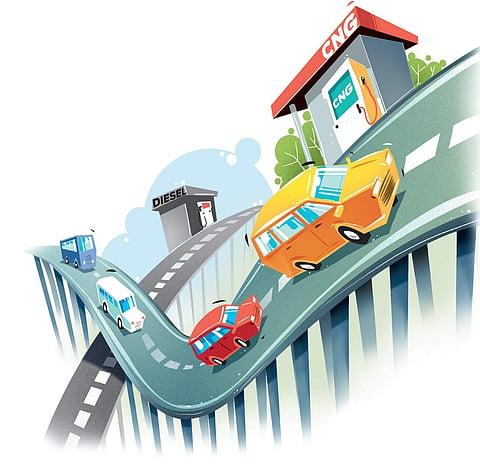

In less than a month, two major automakers —Maruti Suzuki (MSIL) and Tata Motors — have announced plans to phase out diesel models from their passenger vehicle (PV) portfolio from April 1 2020. While MSIL will stop selling all diesel models, such systems would only remain in the small and mid-segment cars for Tata Motors when the new BS-VI emission norms come into effect next April.
Experts believe this will significantly bring down the share of diesel passenger vehicles in overall PV sales and result in the rise of alternative fuel options, the front runner in this race is compressed natural gas (CNG).
“The share of diesel vehicles in the overall PV segment stands at about 20-25 per cent. With two major players planning to discontinue production of diesel vehicles, this share is expected to get skewed further. We expect this share to come down to about 15-17 per cent in coming years, with the share eventually coming down to below 15 per cent,” Darshini Kansara, research analyst, Care Ratings said.
She added that until electric vehicles become an affordable option, CNG will remain a popular alternative. “Till the time affordable electric vehicles really picks up, CNG and LNG will continue to be alternatives to curb vehicular pollution in metros,” Kansara said. India has already announced plans to set up about 10,000 CNG distribution stations by 2030 and many major automakers are working with the government to promote use of CNG cars.
While MSIL, which has seen high double-digit growth for its CNG-powered PVs already, has stated its intention to focus on CNG and hybrid technology to compensate for the phasing-out of diesel vehicles, other OEMs are also expected to have more CNG-powered vehicles in their line-up soon.
Nomura Research Institute Ltd (NRI Consulting & Solutions) in its report on ‘Transforming Mobility Through Natural Gas’ says implementation of BS-VI emission norms from April 1, 2020, will increase the price differential between CNG and diesel vehicles, making CNG vehicles more attractive.
It further added that natural gas vehicles (NGVs) are likely to account for 50 per cent of sales of new three- and four-wheelers in India by 2030, on the back of rapidly developing infrastructure and cost reduction due to domestic manufacturing. On the adaptation of EVs to reduce India’s oil imports, Nomura said EVs can be a potential solution to this issue, but the pace of adoption and financial viability still raises many questions.
Multiple automakers in the past have also raised concerns on EVs in India, mainly due to the expense associated and the lack of support infrastructure. Even as automakers such as Mahindra & Mahindra and Hyundai are about to launch EVs this year, their intake, according to an auto executive, would be limited to cities.
“Where are the charging stations? Even in the tier 1 cities there is a shortage. Even though there is a shortage of CNG stations, they are visible at least,” the executive said, adding that EVs will be a viable option primarily for cab aggregators in the near future.
50% of 3, 4W sales to come from NGVs by 2030: Nomura
With traditional fossil fuels like diesel beginning to give way to alternative fuels, natural gas-powered vehicles (NGVs) are likely to account for 50 per cent of sales of new three- and four-wheelers in India by 2030, says a report by the Nomura Research Institute Ltd (NRI Consulting & Solutions).
According to the report, a strong network of 15,000 CNG and 1,500 LNG stations by 2030 would have the potential to transform the Indian mobility scenario, with an expected 33 million natural gas vehicles on the roads as compared to 3.3 million in 2019. The rise of CNG infrastructure is also expected to help sales. “After the 9th and 10th round, CGD infrastructure will cover 52 per cent area and 72 per cent population and will make natural gas accessible across the country,” the report said.
“As an automobile fuel, natural gas is a proven technology in terms of providing better air quality, sustainability and eco-friendliness,” said NRI Consulting & Solutions India Group Head Ashim Sharma.